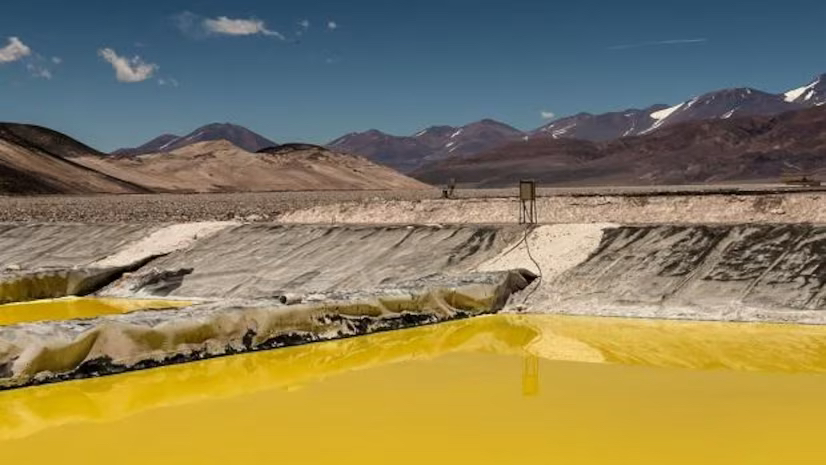India signs an agreement to acquire five lithium mines in Argentina (Business Standard)

- 17 Jan 2024
Why is it in the News?
Recently the Indian govt. signed an agreement to acquire five lithium brine blocks for exploration and development in Argentina.
Context:
- The Mines Ministry, operating through KhanijBidesh India Limited (KABIL), has entered into an agreement with Argentina's state-owned CAMYEN for the development of five lithium blocks.
- CAMYEN, officially known as Catamarca Minera Y Energetica Sociedad Del Estado, is headquartered in the Catamarca province of the Latin American nation.
- Key Points: KABIL, a government-owned entity, will initiate the exploration and development activities for five lithium brine blocks—Cortadera-I, Cortadera-VII, Cortadera-VIII, Cateo-2022-01810132, and Cortadera-VI, collectively spanning an area of approximately 15,703 hectares.
- As part of its expansion, KABIL is planning to establish a branch office in Catamarca, Argentina.
- This marks a significant milestone as it represents the first lithium exploration and mining project undertaken by a government company in India.
- Argentina, situated within the global "Lithium Triangle" alongside Chile and Bolivia, collectively possesses more than half of the world's total lithium resources.
Khanij Bidesh India Ltd. (KABIL):
- It is a Joint Venture Company among National Aluminium Company (NALCO), Hindustan Copper Limited (HCL) and Mineral Exploration Corporation Limited (MECL).
- It has been formed in August 2019.
- KABIL is focusing on identifying and sourcing battery minerals like Lithium and Cobalt.
- KABIL is a joint venture company focused on identifying, acquiring, developing, processing and making commercial use of strategic minerals in overseas locations for supply in India.
Current Statistics About Lithium in India:
- India has recently discovered 5.9 million tonnes of lithium reserves in Jammu & Kashmir and ranks seventh globally.
- The primary lithium reserve in India has been discovered in the Salal-Haimana area of Reasi District in Jammu and Kashmir, with additional smaller reserves identified in Karnataka.
- Presently, India fulfils its entire lithium demand through imports.
- In the fiscal year 2023, there was a notable increase in lithium imports in India, reaching approximately $3 billion (around ?24,900 crore), indicating a 58% growth compared to the figures in FY22.
- More than 95% of India's lithium imports are sourced from China and Hong Kong.
Global Reserves of Lithium:
- Approximately half of the world's lithium resources are concentrated in Latin America, primarily in countries such as Bolivia, Argentina and Chile along with significant deposits in USA, Australia and China.
- Bolivia has the highest identified lithium resources in the world with 20 million tonnes, as per the US Geological Survey data.
- Argentina has the second-largest lithium reserve estimated to be close to 20 million tonnes.
- The United States follows Argentina with 12 million tonnes of lithium reserves.
- Chile ranks fourth globally with 11 million tonnes of lithium reserves.
- Australia occupies the fifth spot with 7.9 million tonnes of lithium reserves, according to the available data.
- China, the largest country in Asia, ranks sixth globally with 6.8 million tonnes of lithium reserve. China, without having the largest lithium reserves, continues to dominate lithium mining and processing in the world.
- Argentina holds a substantial portion, accounting for 20% of the world's total lithium resources, making it the second-largest contributor after Bolivia.
- Argentina is a key participant in the 'Lithium Triangle,' alongside Chile and Bolivia.
- Collectively, these three nations possess over two-thirds of the global lithium resources.
- The Lithium Triangle is a region in the Andes known for its rich lithium reserves.
- Notably, Argentina ranks second globally in terms of lithium resources, third in lithium reserves, and fourth in lithium production.
Importance of the Agreement:
- This agreement holds strategic value as it enables India to enhance its lithium supply, fostering the growth of both countries' lithium mining and downstream sectors.
- It contributes to the diversification of the supply chain for essential materials, aligning with the pursuit of Global Net Zero objectives.
- Given that a significant portion, approximately 54%, of India's lithium imports are currently sourced from China, which dominates 80% of the global supply, this deal helps reduce dependence on a single supplier.
- The initiative aligns with the Mineral Security Partnership (MSP), of which India is an active participant.
